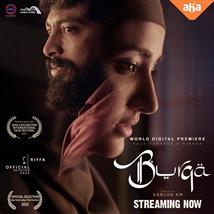Critics Review
3.00
The Forbidden Conversation
Buqa through its crisp runtime has many important and open questions for the conservatives. The film in many instances reminds you of Sarjun�s popular short film, Lakshmi. The film does not end the way a typical viewer would expect because Burqa is not your happily ever after. The film is a trigger into the realm of the expressive behavior of the society.(more)
Source: Meera Chithirapavai, MovieCrow
3.00
A sincere take on repression and humanity
Burqa is a film that not just creates room for a discussion on progressiveness and liberation, but also reflects on the hard-hitting reality of how it is not easy to change or rather accept change. In fact, films like Burqa, The Great Indian Kitchen, and Pagglait explore the truth of how internalised regressive beliefs that oppress and subjugate women are, unfortunately, pervaded across religion, caste, creed and whatnots. In Burqa, we see how education alone is not enough for attaining liberation, but the ability to unlearn and learn is essential. It isn't that only a big revolutionary change can provide much-needed solace. Even a small gesture of opening up to someone who would listen, and embracing one's own feelings is the first step towards acceptance, healing, nurturing the thought of breaking out, and subsequently, liberation for a caged bird-like Najma. Perhaps, as Maya Angelou said, 'Now I know why a caged bird sings...'(more)
Source: Chandini, CinemaExpress.com
3.00
Sarjun KM's 'Burqa', on aha, is a solid, deliberately theatrical (and gorgeously shot) debate on an Islamic practice
Why is Soorya so angry on Najma's behalf? Because he knows, to an extent, what she is going through � because his mother, too, was suppressed by society for a reason. Society decided the fate of these two women. I did not care for the "opening up" of a few scenes that take place outside this house, like the one with Najma's father. It takes away from the claustrophobic atmosphere. The gradual understanding between the leads does a lot more, like in the echo scenes where they turn chairs in different directions so that Soorya does not see Najma's face. And the dialogues keep making us think about the things we do. Do we need to tell small lies in order to keep the people around us happy? Can one person change due to another? There are no easy answers and Sarjun is not after a neat closure to Najma's problems. He wants a debate, and � if you are in the mood for one, his chamber play-like film sparks it.(more)
Source: Galatta, galatta.com
